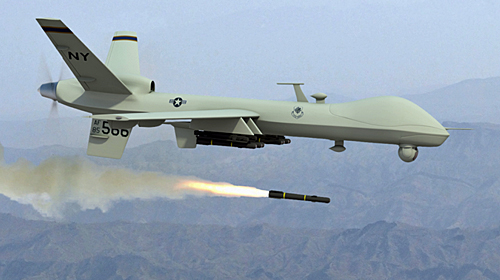
The U.S. government’s targeted killing policy and its use of drones for killing will be the subject of an investigation by the United Nations, it was announced today. The U.N. Special Rapporteur on counterterrorism and human rights, Ben Emmerson, announced today that he will carry out an inquiry into the civilian impact and human rights implications of targeted killing.
In a press conference held in London, Mr. Emmerson stated that under international law, nations have an obligation to “establish effective independent and impartial investigations into any drone attack in which it is plausibly alleged that civilian casualties were sustained,” and if such investigations are not conducted, the U.N. may need to step in and investigate individual drone strikes. The inquiry marks an important step towards ensuring that U.S. policies and practices respect human rights.
Thousands of people have been killed by U.S. drone strikes (conducted by the CIA and the military) as part of a secret targeted killing program that began in 2002 and has expanded dramatically under the Obama administration. Part of the problem with the targeted killing program is the government's vague and shifting legal standards, along with lack of accountability and oversight to ensure that killings are not carried out in violation of the Constitution and international law.
Hina Shamsi, director of the American Civil Liberties Union’s National Security Project, welcomed the inquiry “in the hopes that global pressure will bring the U.S. back into line with international law requirements that strictly limit the use of lethal force.” As Shamsi said, “Virtually no other country agrees with the U.S.’s claimed authority to secretly declare people enemies of the state and kill them and civilian bystanders far from any recognized battlefield. To date, there has been an abysmal lack of transparency and no accountability for the U.S. government’s ever-expanding targeted killing program.”
Jamil Dakwar, director of the ACLU’s Human Rights Program, added, “We hope the U.S. cooperates with the inquiry, and whether it does or not will show whether it holds itself to the same obligation to cooperate with U.N. human rights investigations that it urges on other countries.” He continued, “The U.S. targeted killing program is setting a dangerous precedent for other countries, which will soon have similar drone capabilities but also have less traditional respect for human rights and international law.”
The ACLU is fighting a legal challenge to the U.S. targeted killing program in a lawsuit brought with the Center for Constitutional Rights on behalf of the families of three Americans killed in targeted killing strikes in Yemen in 2011. The ACLU is also litigating two lawsuits under the Freedom of Information Act in an effort to obtain documents outlining the U.S. government’s legal rationale and other details about the program.
Last June, the ACLU raised concerns about the human rights implications of the targeted killing program before the U.N. Human Rights Council, and urged the international community to take action to pressure the U.S. to comply with its international legal obligations.
Learn more about targeted killings: Sign up for breaking news alerts, follow us on Twitter, and like us on Facebook.


